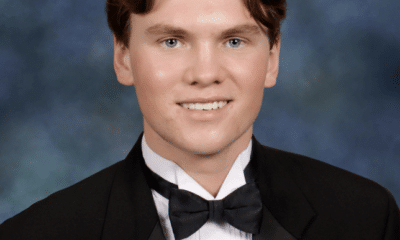Doing Good
PGA Tour Offers More Than Golf by Giving Back to Community
Published
8 months agoon
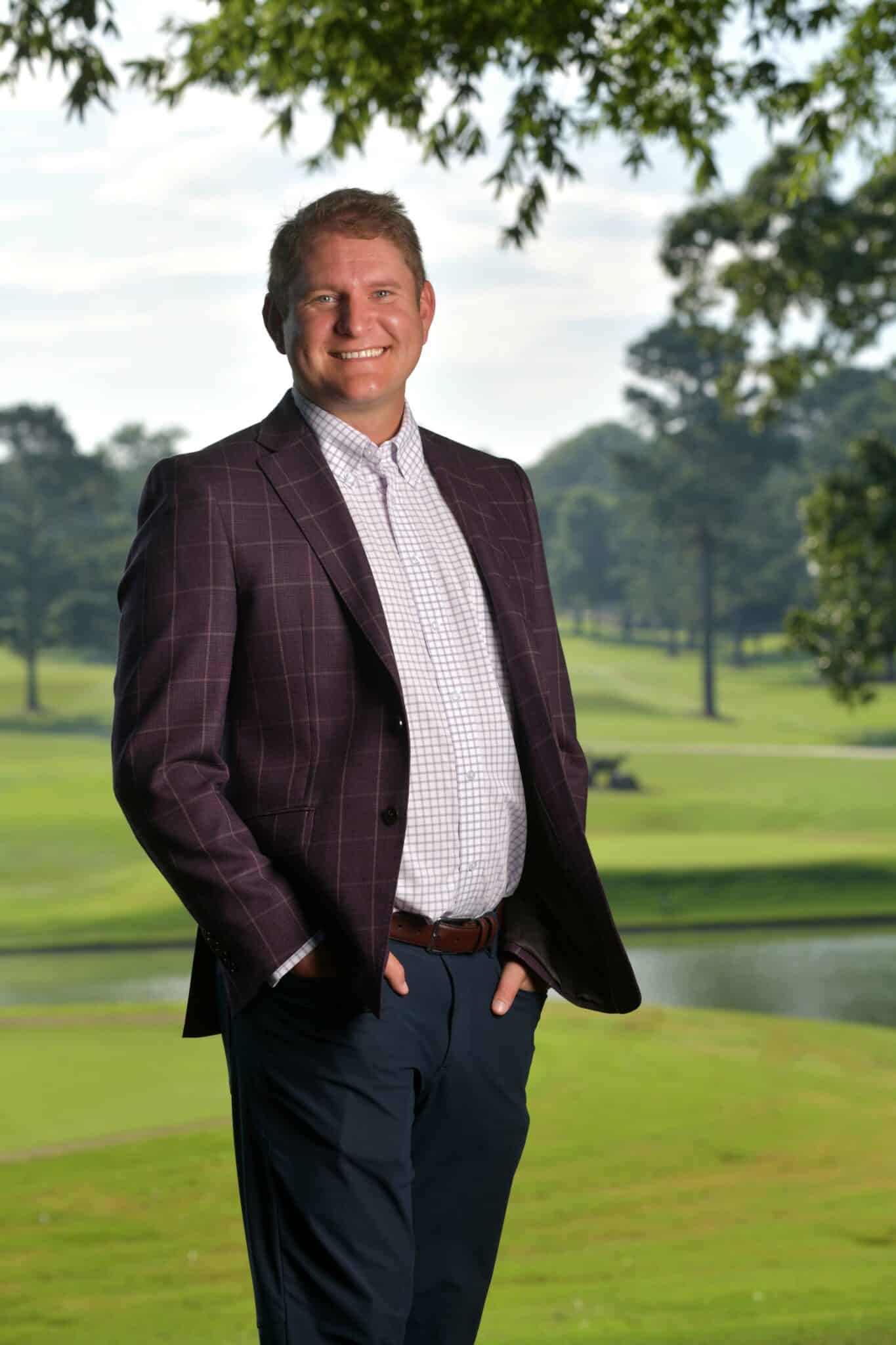
With weather allowing nearly year-round play, golf and metro Atlanta go together like peas and carrots. Alex Urban, executive director of the Tour Championship at PGA Tour, shared his 11-year career journey in the golf industry, the restoration of a historic golf course, as well as the importance of community engagement and charitable initiatives (such as the First Tee of metro Atlanta program) at the Peachtree Corners Business Association’s Business After Hours Speaker Series on July 25 at Hilton Atlanta Northeast.
“It is a busy time of the year for me,” said Urban referring to the PGA Tour Championship being held August 28 through September 1 at East Lake Golf Club in Atlanta.

Urban has been with the PGA since 2013, starting out on the communications team.
“I went to about 50 tournaments in four years. It’s a very fun job for guy in his 20s,” he said, adding that now that he’s a husband and father, he’s happy spending more time at home. “It was a blast. I went to a bunch of really cool places, and I’ve always loved coming to Atlanta.”
Urban has an undergraduate degree from Clemson University in political science and a master’s from the University of Georgia in public relations. The PGA Tour is the only company that he’s ever worked for. With his parents retiring to Greenville, South Carolina from Ohio and his wife’s family in Melbourne, Florida, Atlanta turned out to be the right place to put down roots.
PGA and PGA Tour
If you don’t know a lot about golf and its many tournaments, tours, championships, etc., you might not realize what a major impact it has around the world. First of all, PGA Tour and PGA aren’t the same thing. PGA Tour is for professional golfers in North America. Originally established by the Professional Golfers’ Association of America (PGA of America) in 1916, the PGA Tour became its own league in 1968. Its original name was the “Tournament Players Division,” but it eventually became PGA Tour in 1975.
The PGA Tour schedule runs from January through August with events in the United States, Canada, Mexico, the Caribbean and Europe. The events take place at the same times and locations every year, ending with the championship in Atlanta.
“There are 47 events in the PGA Tour, but we have a tour central, like our minor leagues, called the Korn Ferry Tour. They have 30 tournaments. We have our PGA TOUR Champions. Of course, we also have the Mitsubishi Electric Championship, just a little bit north of here that they play at TPC Sugarloaf,” said Urban. “And so, all in all, there’s like 150 PGA tour events, if you include all those ancillary tours, so it’s quite a production.”
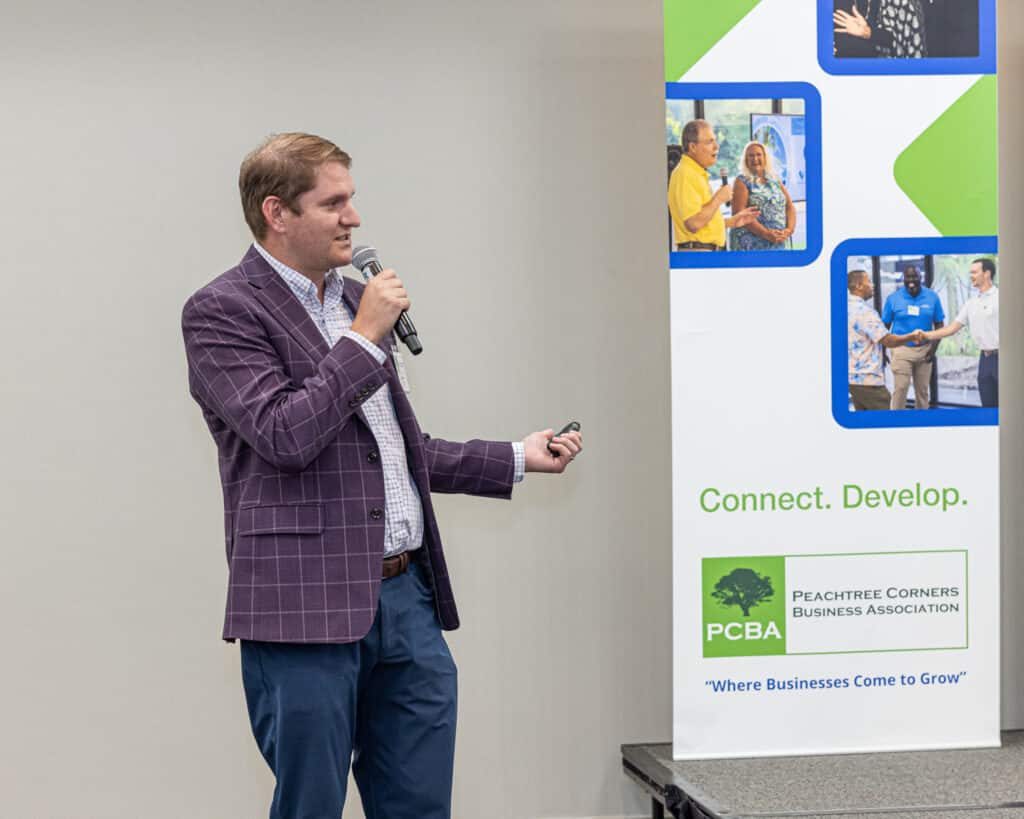
Area’s history with golf
“For those of you that don’t know it, East Lake is a historic golf club and home of the great first champion of golf — Bobby Jones,” said Urban. “He founded the Masters Tournament. He was very big in the 1920s and 1930s when amateur golf was really the pinnacle of the game — right before professional golf took over.”
At the time, Jones was enjoying ticker tape parades in New York City for winning the Open Championship. His origin story began in Atlanta at East Lake where he grew up learning how to play the game of golf. But as with most things, a golf course needs revitalization, even if it’s rooted in history.
“It has undergone a restoration this year,” said Urban. “So, once the last putt dropped from the tournament last year, they have basically replaced every blade of grass, every bunker, every green, to try to reach the goal of reverting it back to the old design features from the early 1900s.”
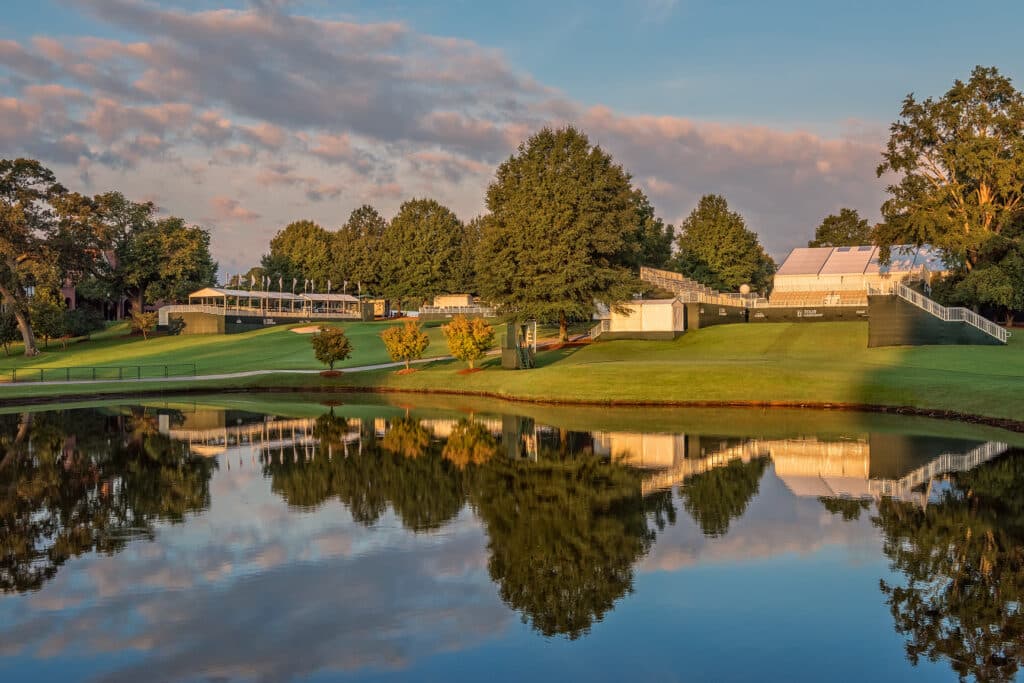
Updates and restorations
He added that a lot of golf courses are going through this right now. According to NBC Sports, Colonial Country Club in Fort Worth, Texas, Medinah Country Club in Illinois, Omni La Costa Resort & Spa in Carlsbad, California and Karsten Creek Golf Club in Stillwater, Oklahoma are among the top courses that are getting facelifts.
Urban said some of the changes are undulations in greens.
“There was a period in the 1980s and 1990s that was really, really obsessed with really fast greens. And the problem with really fast greens is that you can’t make them too slow, because the ball just rolls off the green,” he said. “So, you have to make them flat enough that the ball can actually stand still.”
He added that the fairways are now a little bit wider than they were in the past — making them a little less rough.
“The bunkering is different. It’s a little deeper. It certainly looks different,” he added. “What they’ve done is tried to match the design and the restoration work back to a photograph from 1949. The greens seem a lot larger. They’re a little bit more asymmetrical.”
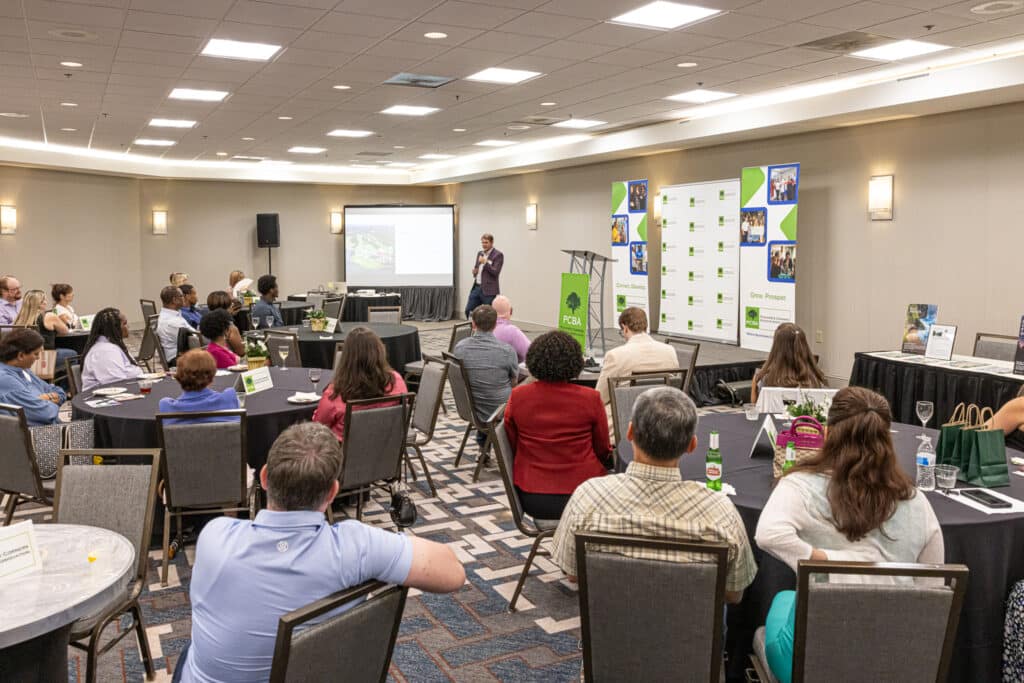
Giving back to community
As much as metro Atlanta has given to golf, the PGA Tour wants to give back to this area.
“Volunteerism and giving back to the community is a huge part of what is central to the PGA Tour and what we do with the Tour Championship,” said Urban. “There’s not one that better exemplifies that than the Tour Championship and the relationship it has with the East Lake community and the Atlanta community as a whole.”
A prize of $25 million to the winner is a big draw for golf’s heavy hitters like Tiger Woods, Rory McIlroy, Jordan Spaeth and Justin Thomas. But this culmination of the tour season would be nothing without the people behind the scenes who make it possible, Urban pointed out. And with an event this massive, many of those people do it for no money — just the love of the game, the pride of the city and the chance to do good.
Event volunteers
“We have 1,300 to 1,500 volunteers in any given year that help out during the tournament in all kinds of capacities,” he said. “We have people that hold their hands up to make sure that nobody is talking during back swings, to people who never see the golf course.”
Those are the ones that are helping with deliveries at the tournament office and guiding parking and things like that. There is also a need for hospitality talent management and groups to help with a computer system called ShotLink that plots all the shots on the course.
“Parking is one of our biggest challenges. We don’t have the luxury of big fields where we can park people right next to a golf course. We’re in a neighborhood. And we try not to be as disruptive as possible,” Urban said. “But even with all that, tournament week is my favorite week of the year. It is a stressful week, but we love what we do.”
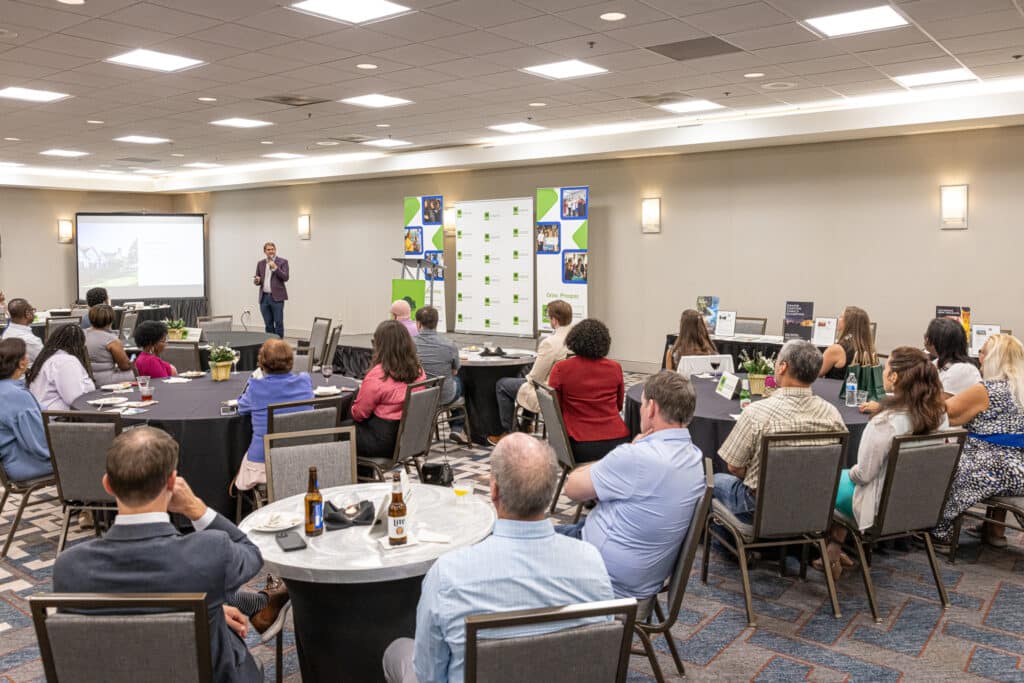
Beyond the tournament
Beyond the tournament, however, is the impact on the community. The Tour Championship, like many golf tournaments, operates as non-profit charitable organization that is required to donate the profit it makes over expenses.
“So, in 2023 our last year’s tournament was a record year and we gave $6.96 million back to charities in the Atlanta area,” he said. “Most notably, the East Lake Foundation gets the majority of our dollars.”
Since 1999, that amount has been more than $54 million.
“That’s something that I think separates golf from other sporting properties and organizations; golf is a vehicle for charitable donations,” Urban said. “If you want to raise money for your organization, you almost always throw a golf tournament.”
A PGA tournament is kind of a larger version of that.
“We just sell a lot more tickets. And we sell more hospitality and have the best players in the world,” he said. “Ultimately, when you’re supporting the tournament through hospitality tickets or buying tickets, you’re supporting your community.”
And a lot of the money goes to the community near the golf course.
“East Lake was once one of the worst ZIP codes in the state in terms of crime, in terms of education,” he said. “Mr. Tom Cousins bought the golf course and wanted to use it as a vehicle to help raise money to help revitalize the community.”
Through the East Lake Foundation, the PGA Tour has helped to generate funds that have gone towards affordable housing, education initiatives and other worthwhile endeavors.
First Tee of metro Atlanta
Another noteworthy charity is First Tee of metro Atlanta.
“It teaches life skills to kids through the game of golf. It’s not necessarily meant to teach kids how to play golf, but some become quite good and get college scholarships,” said Urban. “There are First Tee kids now that are PGA Tour players.”
“First Tee teaches young ones that golf is a sport where you call your own penalties on yourself and you have to learn how to manage it. Children are taught how to manage anger and things like that,” he added.
“Being a part of the Atlanta community is really, really important to us. We’re still trying to spread the message about what we do from a community engagement standpoint and from a charitable aspect because I think that’s something that sports don’t necessarily do,” said Urban. “I think it separates us and, like I said, when you’re buying tickets to our event, you’re supporting the revitalization of East Lake, but now other communities and the First Tee and things like that as well.”
Related
Arlinda Smith Broady is part of the Boomerang Generation of Blacks that moved back to the South after their ancestors moved North. With approximately three decades of journalism experience (she doesn't look it), she's worked in tiny, minority-based newsrooms to major metropolitans. At every endeavor she brings professionalism, passion, pluck, and the desire to spread the news to the people.

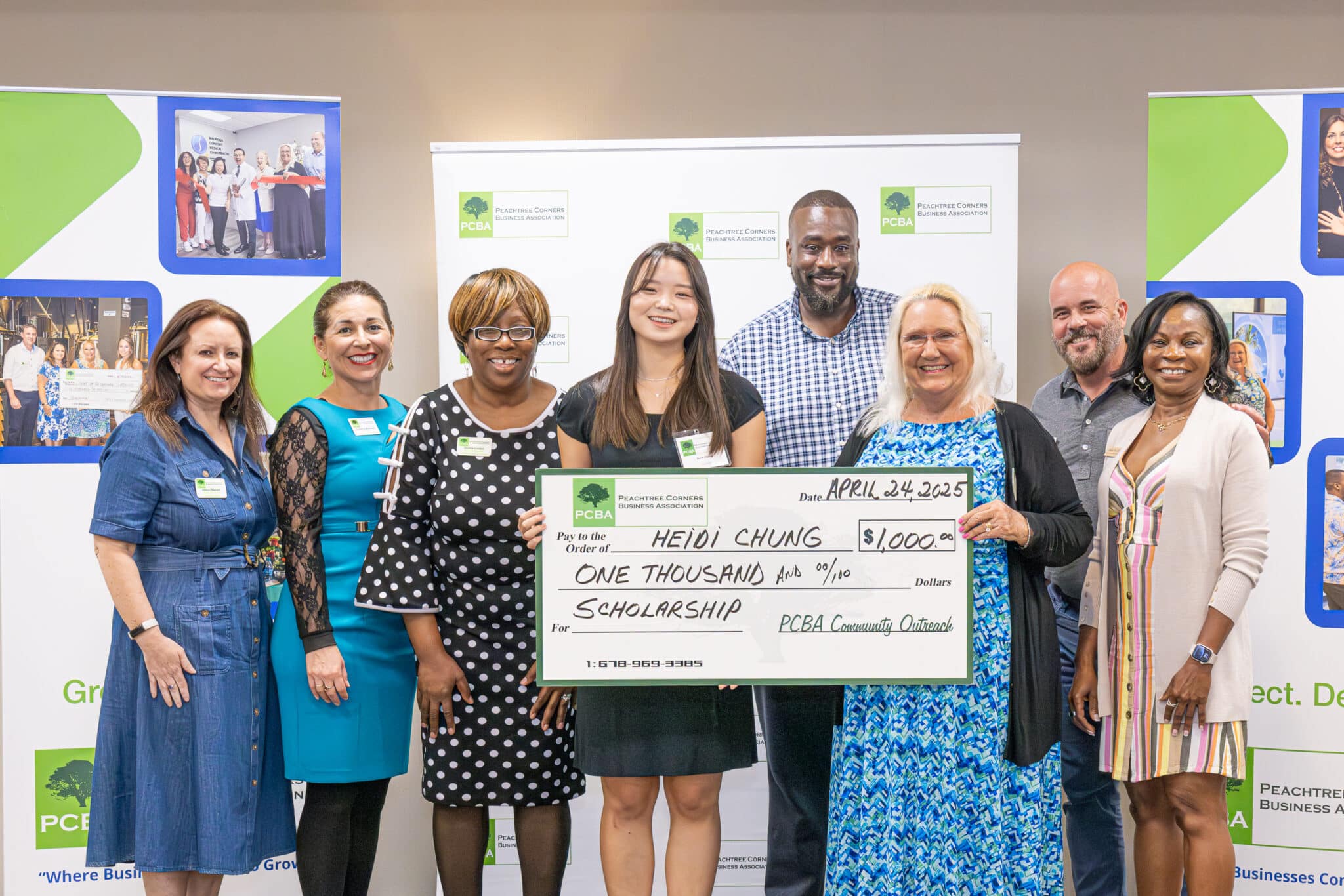
The Peachtree Corners Business Association (PCBA) awarded local high school senior, Heidi Chung, a $1,000 scholarship during their April 24 Business After Hours event. Heidi and her family were presented with the scholarship and introduced to the organization’s members and guests at the monthly gathering.
Heidi was accepted by several colleges and has selected the University of Kentucky to continue her education, pursuing a degree in nursing. When asked what lessons she has learned from her experiences volunteering and serving in the community throughout her life, Heidi commented, “I have learned that true leadership is about service, taking initiative and persevering through challenges.”
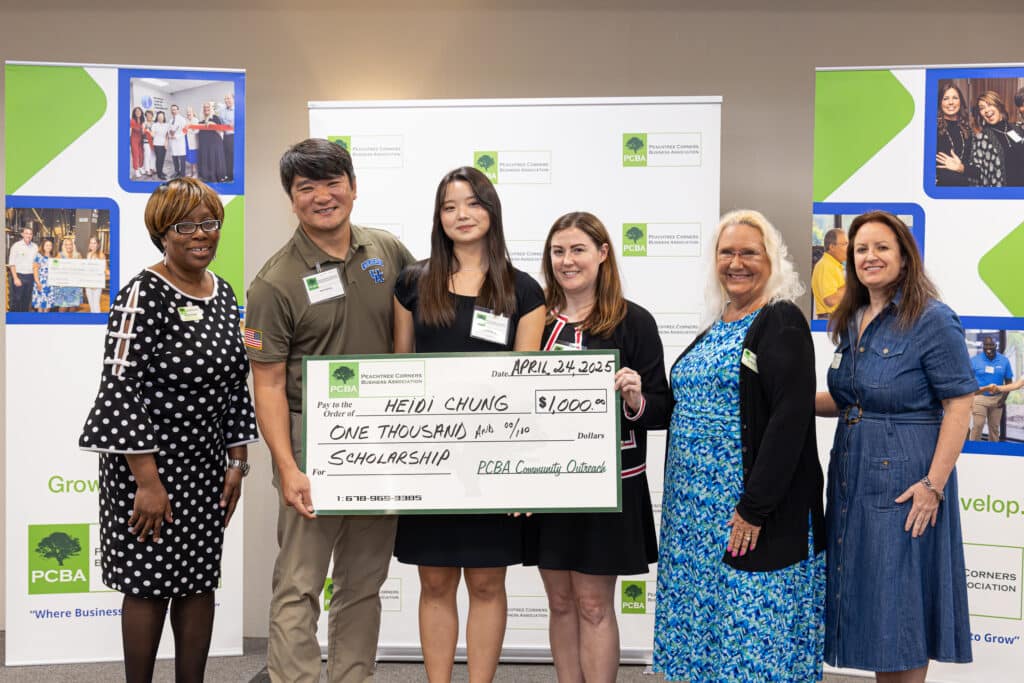
Scholarship Chair Donna Linden and Outreach Director Suzanna Martinez shared that the scholarship committee was impressed with Heidi’s many accomplishments, “whether she was organizing fundraisers, leading performance groups or helping athletes recover from injuries, Heidi demonstrated a positive impact on the community, as well as outstanding academic results.”
Funds for the PCBA Community Outreach Program are raised throughout the year from PCBA membership, sponsorship and an annual charity event. Donations and scholarships are awarded at PCBA’s monthly events so that members have the opportunity to learn more about the individuals and organizations.
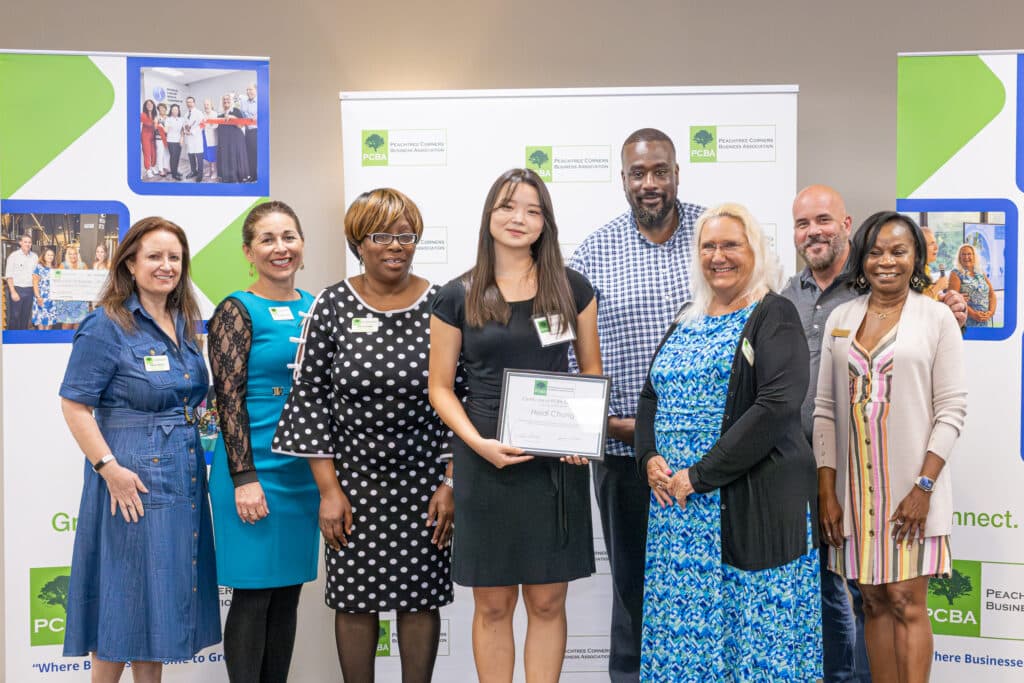
“We are so proud that the PCBA has … awarded 20 scholarships to outstanding future business leaders and donated in excess of $173,000 into our metro Atlanta community over the last 13 years,” stated Lisa Proctor, PCBA board president.
About Peachtree Corners Business Association
“Where Businesses Come to Grow,” the Peachtree Corners Business Association is a business membership organization that focuses on innovative approaches, programs, shared resources, community outreach and opportunities for member businesses and professionals to connect, develop, grow and prosper.
The PCBA is made up of businesses of all sizes and types who want to expand their reach and grow their business within Peachtree Corners and the greater metro Atlanta area.
For more information, call 678-969-3385, email membership@peachtreecornersba.com or visit peachtreecornersba.com.
Related
Community
Katherine Lafourcade — A Journey of Passion, Resilience and Giving Back
Published
6 days agoon
April 29, 2025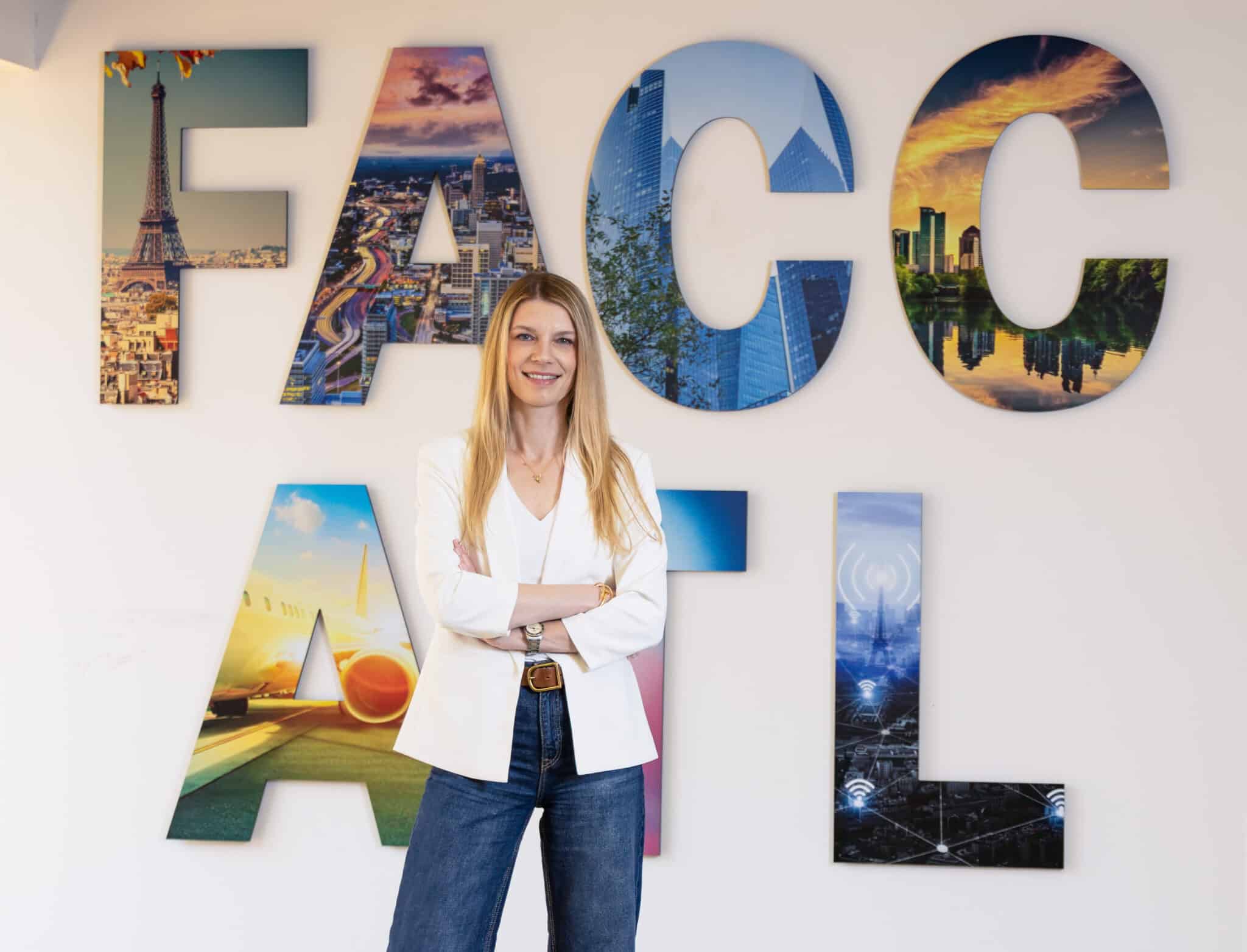
Katherine Lafourcade, executive director of the French American Chamber of Commerce Atlanta-Southeast (FAAC Atlanta-Southeast), located at Curiosity Lab Peachtree Corners, discovered her passion for French early in life.
As a schoolgirl in England, learning French ignited a spark in her. And by age 13 she’d informed her mother that she planned to be bilingual, live in France and marry a Frenchman. Later, armed with a degree in international business and French, she made her way to an internship in Paris, achieved fluency and did, in fact, eventually marry a Frenchman.
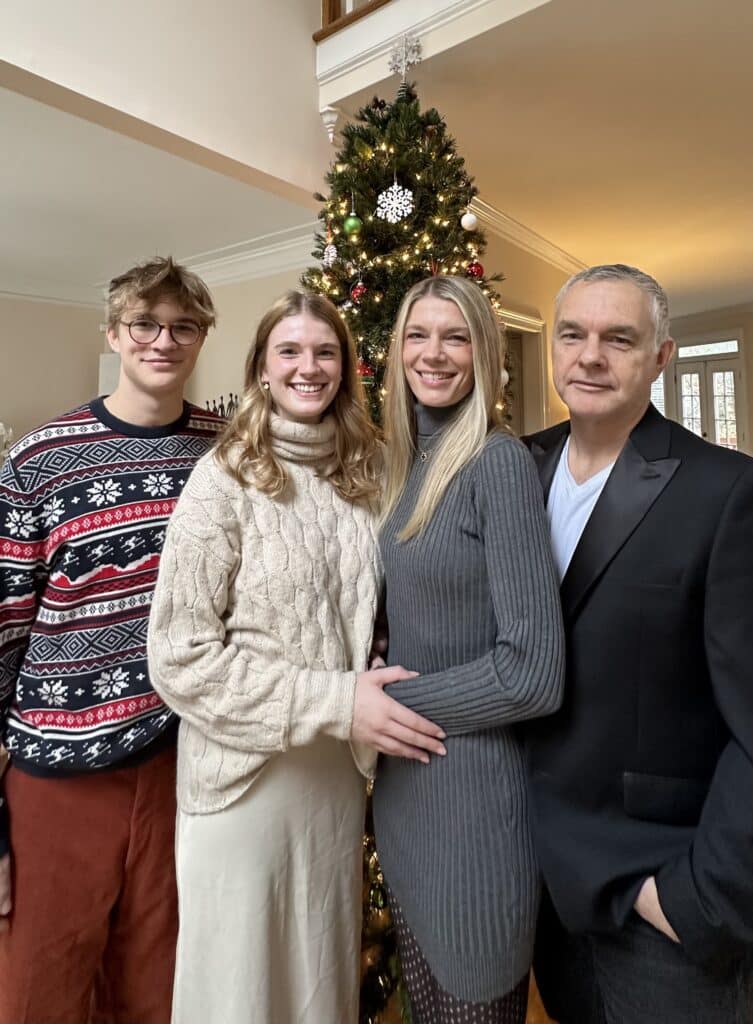
“I worked for 10 months in Paris for a defense company … in the purchasing department. I was basically learning French. I was an assistant, and it was very much French immersion,” Lafourcade recounts.
Having reached an important linguistic milestone, Lafourcade couldn’t wait to share the progress with her mother. “I rang her so excited one day, forgetting she was still teaching. […] They had to get her out of the classroom to come to the phone. All I wanted to tell her was that I’d had a dream in French,” she laughed.
Career moves and motherhood
Lafourcade held various jobs in Paris, then moved to Nantes on the west coast before a new opportunity led her to Geneva. She’d spend more than 15 years in Switzerland. It was there that she met Alain, her Frenchman, and had two children, Lina and Theo.
Balancing motherhood and a career was important to Lafourcade. While initially staying home with her young children, she soon sought a professional outlet.
“For me it was important to show my kids that mums are able to work and have professional roles,” she stated.
Entrepreneur
As women so often do, Lafourcade adapted to meet her family’s needs, but being a stay-at-home mom was not her long-term plan. “I did struggle at that point. […] It was difficult. […],” she confessed.
To work around their circumstances with young children, she and her British biochemist friend co-founded a French/English bilingual preschool, allowing for a business to flourish alongside their children.
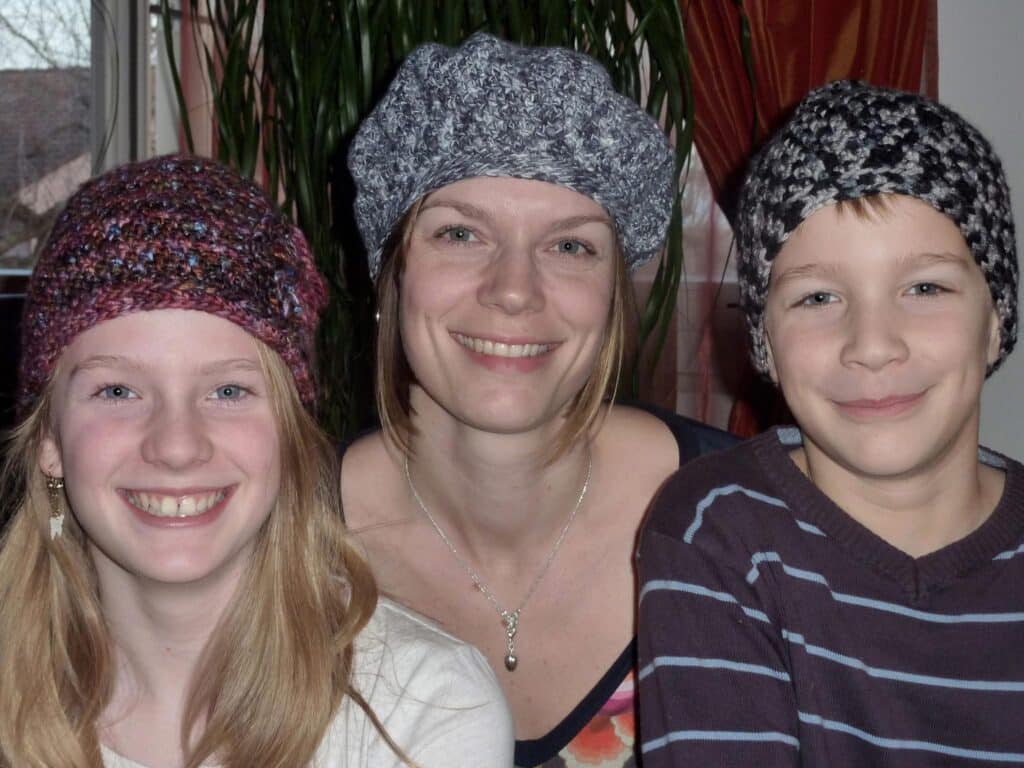
Naysayers suggesting they shouldn’t embark on this venture because they were women, mothers and expats only strengthened their resolve. They ran the successful business for five years, allowing their children to thrive with friends in a nurturing environment.
They secured an employee with early childhood education qualifications. Her friend oversaw the books and finances, and Lafourcade spearheaded communications.
“We were everything — the CEOs and the cleaners,” Lafourcade chuckled.
Once their children were older, the business was sold. Lafourcade then held jobs in recruitment, education (as administrative staff) and manufacturing. Her last job in Switzerland was with Nestlé for five years, serving as an executive assistant to the vice president of Nestlé Skin Health.
As varied as her roles have been, they share a common thread. “In all of my jobs, I’ve always found something where I can use both languages,” she said.
Disaster strikes
In December of 2016, 12-year-old Theo started getting sick. What began with mysterious symptoms like leg and chest pains increased in intensity to the point of tearful nights that landed him in the hospital with a low-grade fever during the family’s trip to the UK in early 2017.
“I’m sure he’ll be fine,” Lafourcade told herself as she spent a milestone birthday in the hospital while Theo underwent a battery of tests. In the meantime, Alain and Lina returned to Switzerland. Lafourcade and Theo stayed behind, hoping for answers that never came.
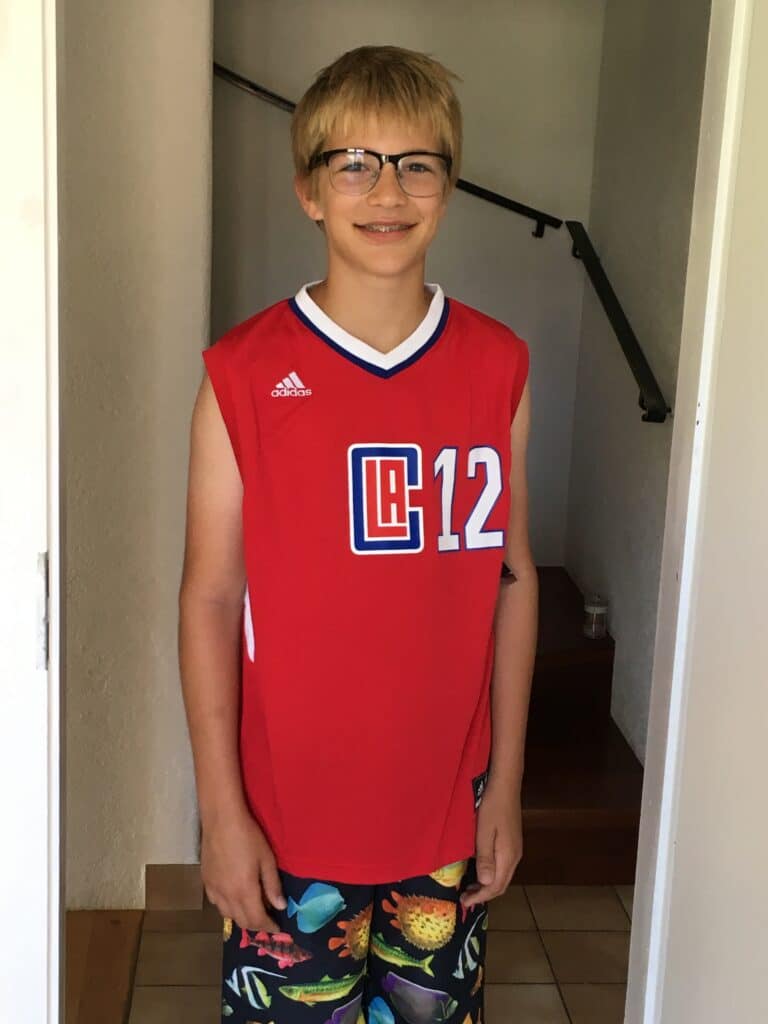
Ultimately, the decision was made to forward all lab results to Theo’s doctor in Switzerland and return home for further investigation. Lafourcade’s sister, a medical professional, reviewed the labs and harbored concerns.
Amidst uncertainty, Lafourcade took Theo, unwell and tired of being poked and prodded, to the pediatrician upon their return.
After cautioning everyone to remain calm, the doctor’s demeanor changed upon feeling Theo’s enlarged spleen, sending them to the hospital immediately.
It’s leukemia
Reliving the trauma, Lafourcade felt the emotions of Friday, January 13, 2017, surface. The diagnosis was acute lymphoblastic leukemia (ALL). Chemotherapy treatments began that same day.
“You don’t get the words that are being said,” Lafourcade confided. “It feels absolutely impossible. This is your healthy, happy, normal kid. How have we gone from that to cancer?”
The port placed in Theo’s chest remained there for the duration of his grueling treatment protocol — over three and a half years.
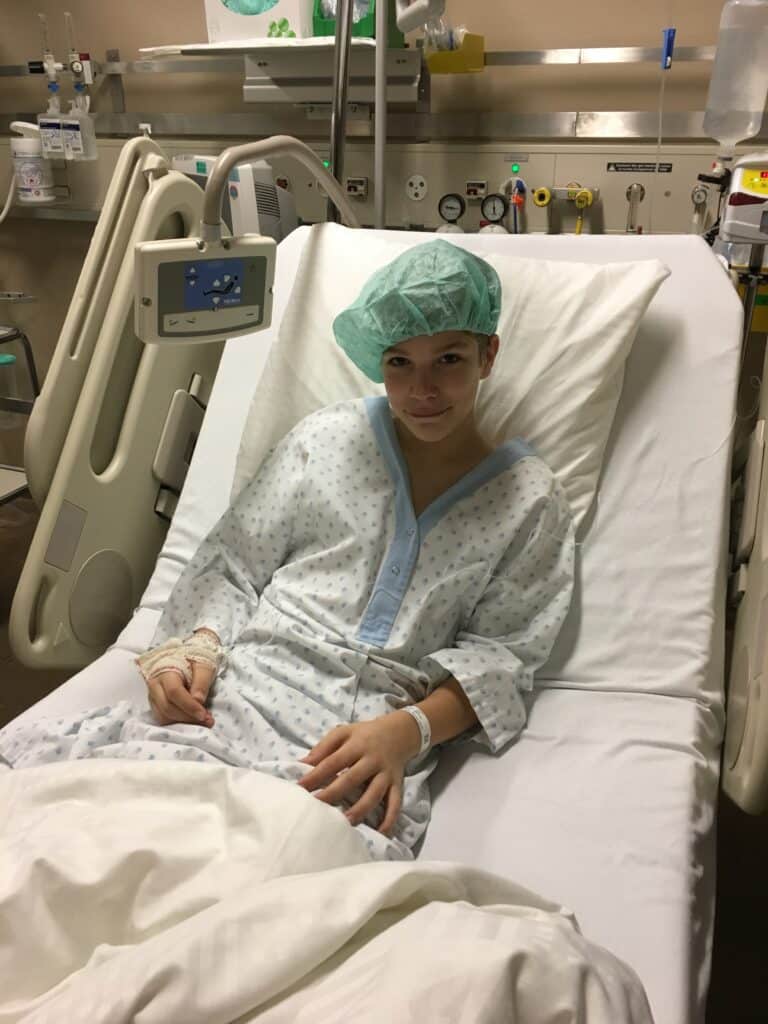
“Leukemia is tough. You learn a lot very quickly because you’re kind of put on this crazy train going 100 miles an hour,” Lafourcade shared.
Leukemia originates in the bone marrow where a single white blood cell undergoes a mutation and multiplies, triggering abnormal growth and division. The proliferation of abnormal cells crowds out healthy white and red blood cells and platelets.
Lafourcade explained, “Normally white cells defend the body. They’re part of your immune system. Once they’ve mutated, they don’t defend anything. They multiply much too fast, and they don’t die quickly enough.”
Phase one
It was the buildup of leukemia cells within Theo’s bones, especially large bones like the sternum and femur, which created massive pressure and pain. Chemotherapy alleviated his discomfort. However, this intensive phase of treatment made school difficult and brought with it all the usual side effects: hair loss, nausea and lethargy.
Lafourcade speaks highly of the care Theo received at the CHUV: Centre Hospitalier Universitaire Vaudois. There, a cocktail of drugs was administered one to four times weekly; some administered into the port, some in a 24-hour drip requiring overnight stays. Others required days of saline pre- and post-hydration to avoid an assault on his organs.
As for Theo’s mood, Lafourcade recalls when he’d had enough. “You have to imagine a 12 and a half, 13-year-old. […] At one point he told me he wanted to die. He said, ‘I don’t want to do this anymore.’ It was horrendous for all of us.”
Constantly in and out of the hospital, Lafourcade was unable to work. Her team at Nestlé took on her workload and checked on her regularly.
When the easy part is hard
Nine months into Theo’s relentless treatment, the Lafourcades anticipated the simpler “maintenance” phase, but things unfortunately took a turn for the worse. Frantic testing revealed an intestinal parasite wreaking havoc on Theo’s already weakened immune system.
There was no rest for mother or son. Lafourcade logged each time he vomited or went to the bathroom — up to 15 times per night. Theo was in agony. When the infection spread to his bloodstream, septicemia took hold. His blood pressure was crashing.
“His lungs got the majority of the infection, so there was not enough oxygen getting from his lungs into his blood system,” Lafourcade explained.
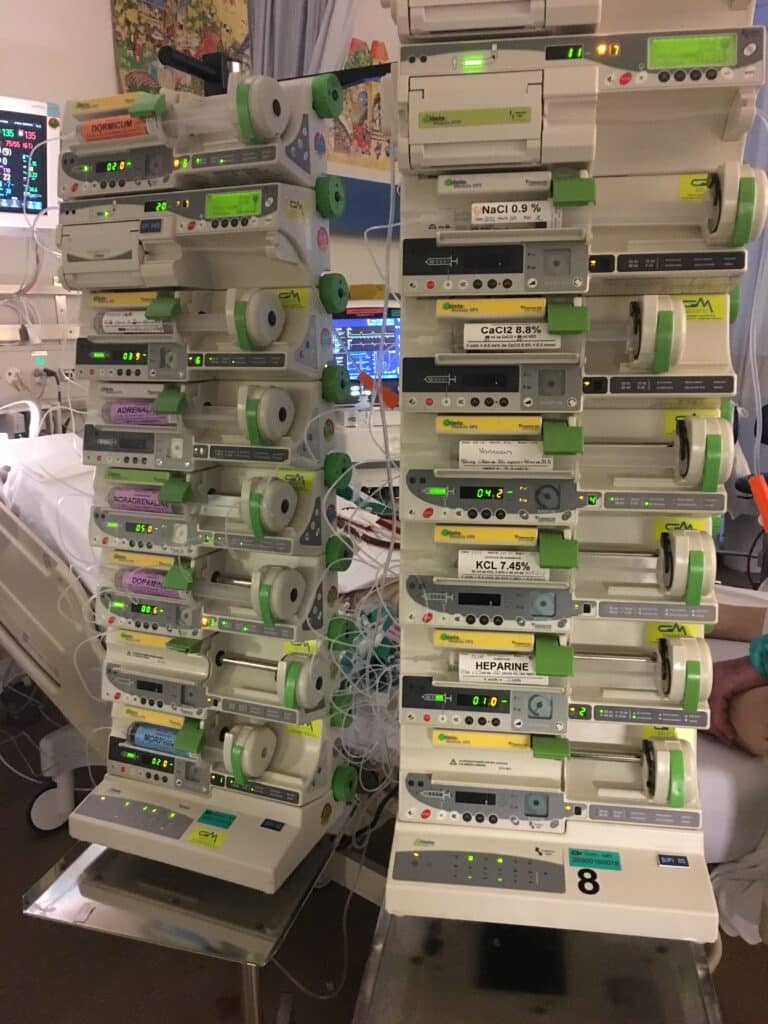
In coma
As a last resort, Theo was placed in a coma and put on extracorporeal membrane oxygenation (ECMO) life support. Mimicking the functions of the heart and lungs, the machine adds oxygen to and removes carbon dioxide from the blood outside of the body and then sends it back into circulation.
“It’s brutal. It’s like open heart surgery. You put two tubes directly onto the heart,” Lafourcade said. At the same time, Theo was on a ventilator for breathing, on dialysis for his failing kidneys and had a tracheotomy to prevent damage to his vocal cords due to extended intubation.
“The machine kept him alive for over three weeks, […] Normally people don’t go on that machine for long because the body is only able to cope with the blood going through this kind of machinery for a short period of time.”
In fact, Theo hemorrhaged multiple times. He needed more blood, fast. Lafourcade recalls doctors sounding an alarm while yelling, “He is empty!” Then she watched as large syringes of blood were injected into tubes connected to his body to boost his blood volume.
A mother’s voice
Having heard that maternal voices can comfort patients and improve their condition, Lafourcade sat by Theo’s side reading to him for the better part of three weeks.
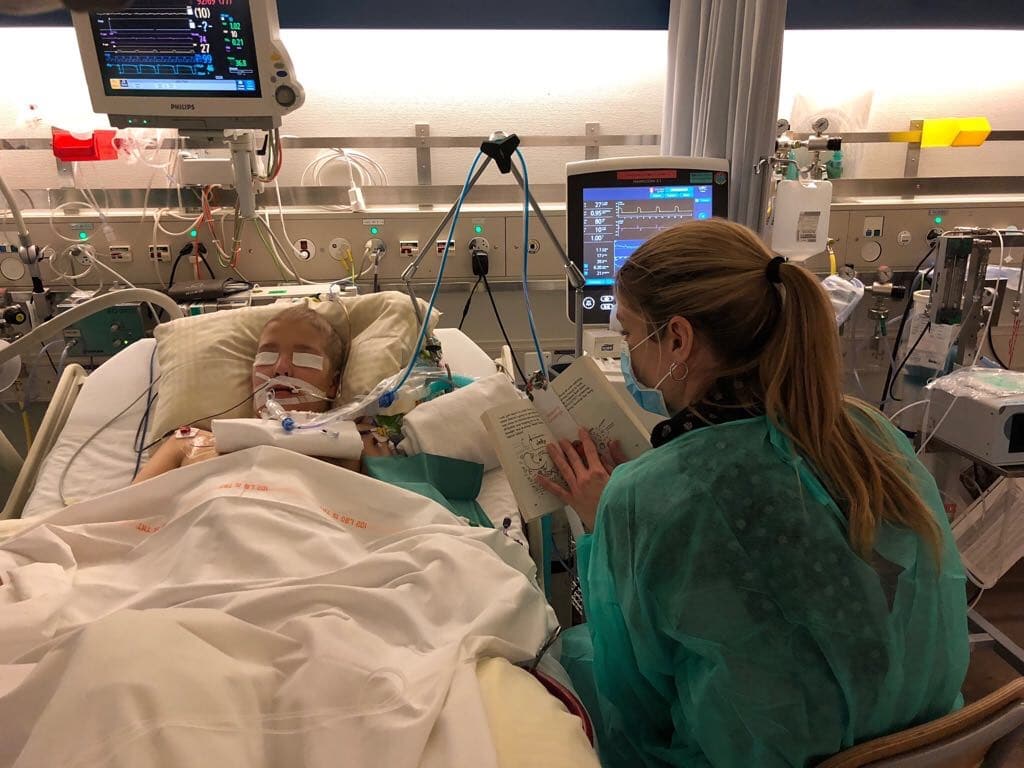
During times when Theo seemed to be “closer to the surface,” his heartrate increased and he exhibited twitching or facial movements. As Lafourcade read to him, she noticed that his agitation would subside.
A rude but astonishing awakening
It was a harrowing decision to take Theo off life support in January. Doctors weren’t sure his heart and lungs could withstand it. He bled profusely, requiring another blood transfusion, but miraculously, he made it.
After nine months of feeling terrible from chemotherapy and being assured it would get easier, he was angry when he woke up. Things were not better.
He’d lost so much muscle mass he could barely sit up. His body was riddled with pressure sores from having been immobile. “He was a little skeleton who couldn’t speak because of the tracheotomy. He was furious. All I could see was this fist by the side of his bed,” Lafourcade recalled.
It took months of daily physiotherapy for Theo to relearn how to sit, stand, walk and grip a pencil.
Coming to America
Just as Theo was transitioning out of the ICU, Alain was offered a position abroad.
“We both said, ‘This feels like something we should look at,’” Lafourcade said. They discussed it with Theo’s doctors first.
They learned that the treatment protocol for leukemia in the U.S. is identical to that of Switzerland. Moreover, his doctors felt the move would benefit Theo psychologically.
The next step was talk to their kids. “I hadn’t even finished my sentence when I was asking Theo, who was 15 at this point and he said, ‘I want to go tomorrow.’”
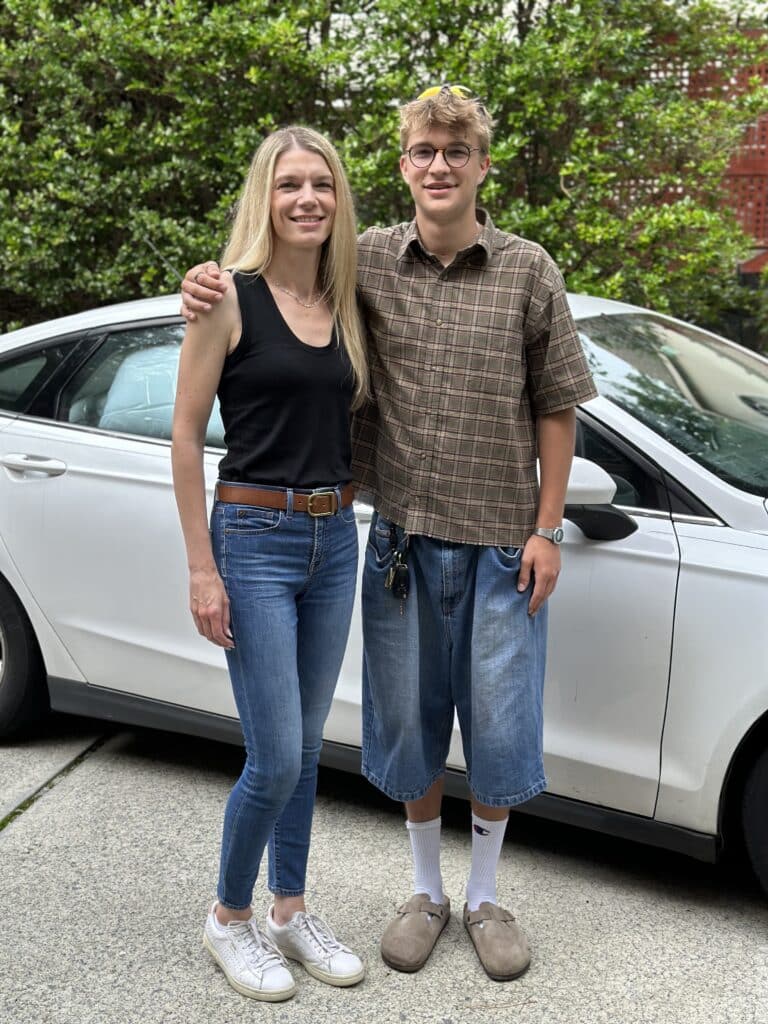
Lafourcade believes it was the ultimate opportunity for him to leave the nightmare behind and start afresh. Unfortunately, Lina was not as enthusiastic about leaving Switzerland during her senior high school year.
In the U.S., Theo continued his treatment at Children’s Healthcare of Atlanta Scottish Rite Hospital. Lafourcade trusted the capable doctors there implicitly. The American doctors simply picked up where their Swiss counterparts had left off.
Theo rang the bell at the end of his treatment in May 2020, making May of this year a particularly important anniversary. After five years, the likelihood of recurrence is significantly lower. Today, Theo is a sophomore at UGA, interested in studying medicine because he wants to give back.
Boss lady and super mom
The Lafourcades joined the FACC Atlanta upon moving to the U.S. to connect with the French community here. At the gala event of 2021 it was announced that the executive director would be returning to Europe. Acquaintances suggested Lafourcade was made for the job.
The position involves speaking French; it instantly sparked her interest. After doing some research about the role, the nature of non-profit organizations and the mission of the chamber, Lafourcade concluded it would be a good fit. She started in January of 2022.
There was some juggling of car rides, study help and college visits. “You have to be clever with the hours you work. The chamber isn’t a [traditional] 9-to-5. There’s a lot of afterwork stuff. It can be a fairly unusual time frame that I work within, especially with France, you’ve got the six hour time difference,” Lafourcade shared.
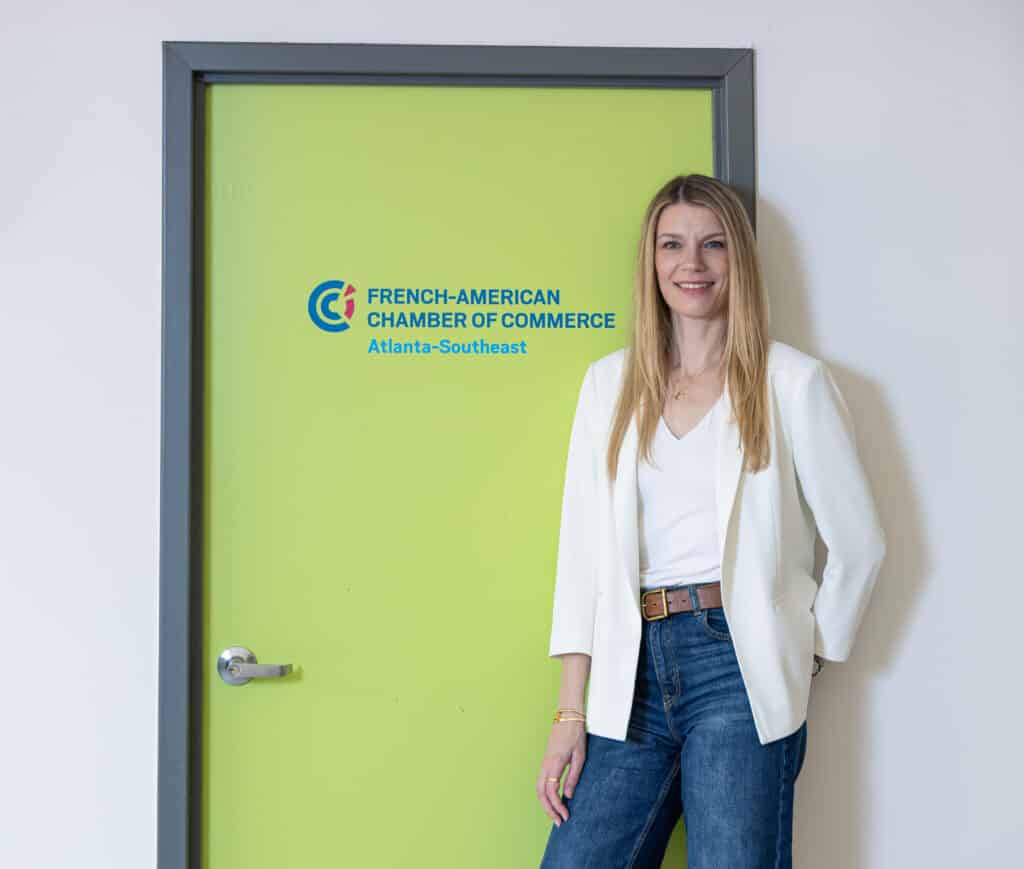
She considers herself lucky to have more flexibility than she would in a typical office environment. Some days are long, but her children see the value in what she does, and that motivates Lafourcade.
Her vision is for the chamber to be the “go-to” for any French companies here, all Francophiles in Atlanta and any French companies moving in. She collaborates closely with The Alliance Française and the French Consulate to support the vibrant French community in metro Atlanta.
According to Lafourcade, board members have noted the chamber’s improved position under her leadership over the past three years.
The FACC Atlanta-Southeast was founded in 1985. After highs, lows and multiple changes, they celebrated 40 years this past February. “We’re looking to go onward and upward,” Lafourcade smiled.
Despite talks of tariffs creating challenges, the FACC’s mission remains the same: to provide a soft landing for French companies establishing themselves in the region.
The floodgates open
In May 2022, a significant change occurred: the Food and Drug Administration lifted the “mad cow” (variant Creutzfeldt-Jakob disease) restrictions on blood donation for people who had lived or traveled in the United Kingdom, France and Ireland from 1980 onward. The Lafourcades were delighted; they were finally eligible to donate.
“It’s the notion of giving back, it’s community, it’s people in need,” Lafourcade said. “I never thought that I would be in a situation where anonymous blood donors would save my son’s life. And yet, that’s what happened.”
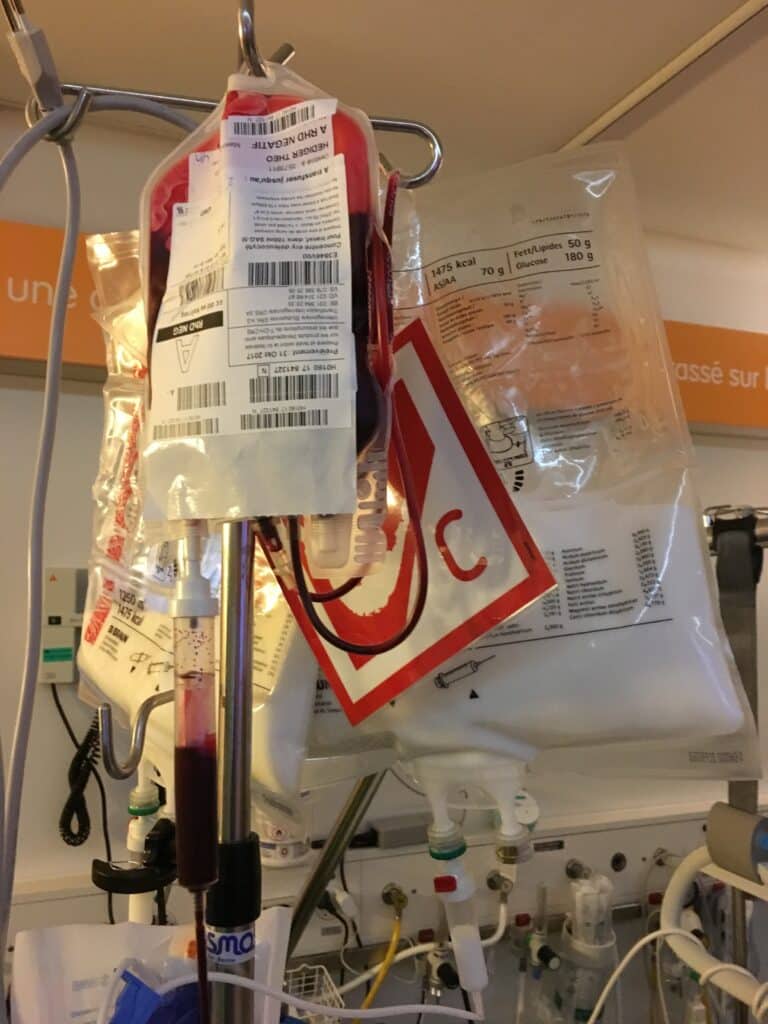
Although it may be human nature to think this type of misfortune only befalls others, Lafourcade feels we must ask ourselves, “What if one day it’s you or your child?” Because human blood can’t be manufactured, we’ll always depend on people’s generosity for it.
Initially, she alerted members of the FACC Atlanta that the rules of blood donation had changed for them. “I’m going to use my voice as the leader of the chamber to get the word out. One side of it is the expat community. Another side is people stopped donating during COVID and haven’t gotten back to it,” she shared.
Lafourcade believes her story can serve to strengthen a sense of community, particularly in a world feeling increasingly uncertain. “We’re in such a weird world right now where everything is scary, and people don’t know what the future holds,” she said.

She focuses on tangible actions people can take to quell that dreadful feeling of helplessness. And, having been on the receiving end of this life-saving practice, she wishes to inspire others to donate.
“Giving blood is free! You can do it several times a year and you will for a fact be helping somebody. It’s a case of helping your neighbor and doing something good if you can.”
Raising awareness
Turning trauma into positive action, Lafourcade feels a sense of duty to host blood drives. My husband and I were donors at her first one last September.
It was a painless, streamlined process. Snacks and refreshments were generously provided. Meeting community members and greeting Lafourcade were perks.
“The first one that you came to … we did a great job. Our goal for the drive was 18 units and we smashed that, we got 34 units,” Lafourcade beamed.
To spread the word beyond the FACC, she is now reaching out to the communities in which she lives and works — Johns Creek and Peachtree Corners respectively — to share her experience and encourage participation.
World Blood Donor Day
Lafourcade is hosting her next Red Cross Blood Drive at Curiosity Lab on World Blood Donor Day, Saturday, June 14, from 11:30 a.m. to 4:30 p.m., and encourages residents to help in whatever way they can.
“I want everybody in Peachtree Corners thinking, ‘I want to do my part.’ If people can’t give blood they can volunteer or help spread the word,” she said.
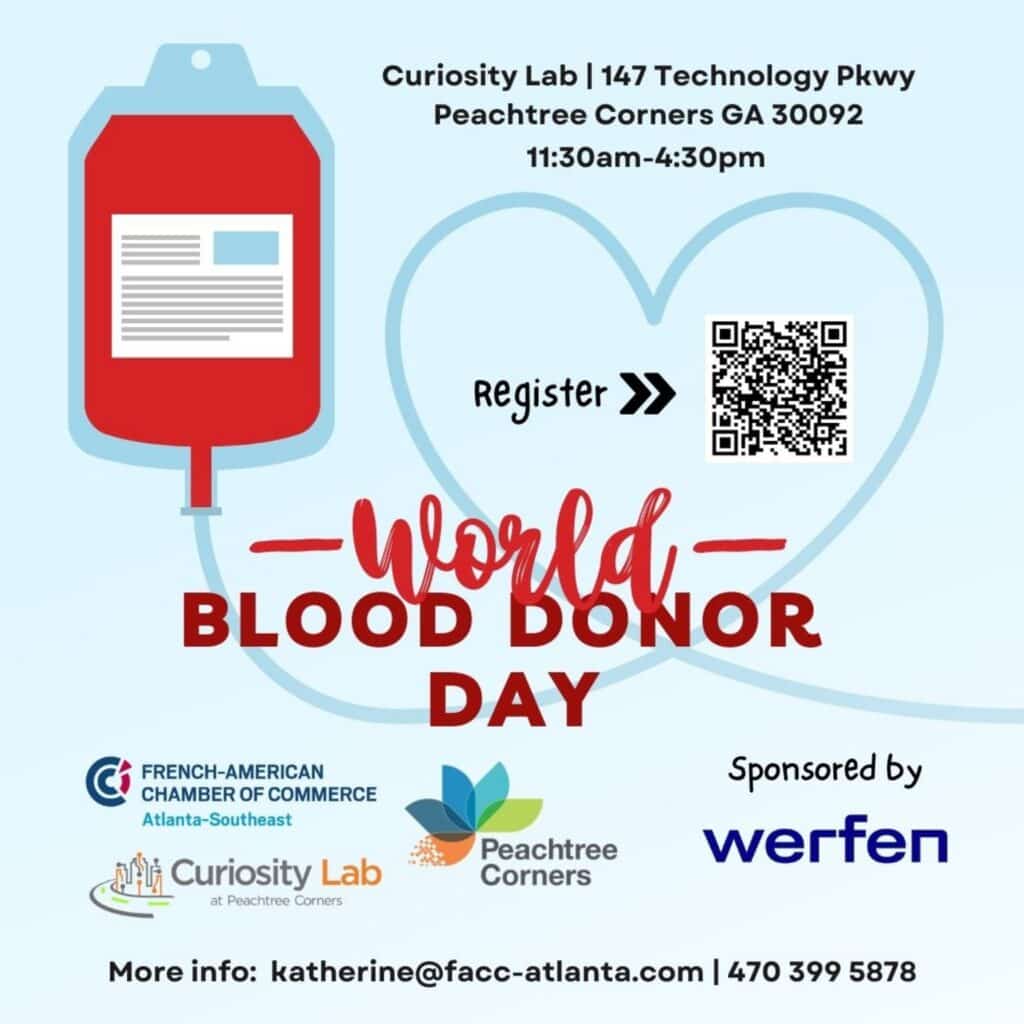
You can sign up to donate on the FACC Atlanta website or download the American Red Cross Blood Donor app to schedule and manage appointments and follow your blood’s journey to see where it gets used.
A woman in leadership
Katherine Lafourcade — executive director of the French American Chamber of Commerce Atlanta–Southeast, a passionate advocate for cultural and business exchange and a resilient mother — has journeyed from a schoolgirl captivated by the French language to leading a prominent bi-national organization.
Her story is one of determination, adaptability and turning profound personal challenges into a powerful force for good.
For more about the FACC Atlanta-Southeast or to sign up for the June blood drive, visit facc-atlanta.com. You can also connect with the organization on LinkedIn.
Related
Community
PCBA Accepting Scholarship Applications for Class of 2025 Seniors
Published
3 months agoon
February 14, 2025
The Peachtree Corners Business Association (PCBA) continues their philanthropic work with an annual scholarship opportunity for local high school seniors who demonstrate community spirit and initiative and meet the requirements. The scholarship program was established to raise awareness among high school students of the need to give back to the local community and their school.
Applications are now being accepted for the 2024-2025 Student Scholarship Program. The PCBA will award one $1,000 scholarship to a deserving graduating high school senior.
Students are invited to apply now by completing the scholarship application. The deadline to apply is 5:00 p.m. on March 31, 2025.
Application details
Applications should be emailed to scholarship@peachtreecornersba.com.
Sealed transcripts may be sent to the PCBA office at
4989 Peachtree Parkway, Suite 200
Peachtree Corners, GA 30092
Click here for the current scholarship application for eligible graduating seniors.
Qualifications include:
Must be a graduating senior & meet at least one of the following to qualify:
– Resident of Peachtree Corners
– Senior at Norcross HS, Wesleyan HS, Paul Duke HS, or Duluth HS
– Child of PCBA member
Applications must include the application form, a copy of the student’s sealed or official transcript showing cumulative GPA and an essay of 500 words or less describing why you are the best candidate for the scholarship, including three (3) things you’ve learned that you believe will help you in the future.
A separate page listing any of the following the student has been associated with, along with a brief description of your involvement is also required:
- School organization affiliation
- Sports affiliation and extra-curricular activities
- Areas of community involvement
- Personal time donated to charitable/humanitarian causes
- Activities completed or participated in to support the community, healthcare workers, first responders and others.
“The PCBA is proud to continue this scholarship opportunity, which recognizes local students who have positively impacted the community,” says Donna Linden, PCBA board member. “In previous years, we were impressed at the dedication to community service we saw from applicants. We look forward to honoring the deserving student who receives this scholarship.”
Funds for the scholarships are raised throughout the year from PCBA membership, sponsorship and the organization’s annual charity event.
For questions regarding the scholarship program, please email scholarship@peachtreecornersba.com.
Related
Read the Digital Edition
Subscribe
Keep Up With Peachtree Corners News
Join our mailing list to receive the latest news and updates from our team.
You have Successfully Subscribed!

GA Tech, Peachtree Corners Solidify Partnership with First-of-its-Kind Venue

Peachtree Corners City Guide 2025: Spring/Summer Digital Edition

Two Peachtree Corners Business Leaders Named Finalists for EY Entrepreneur Award

GA Tech Launches First-of-its-Kind GT Atrium in Peachtree Corners

Katherine Lafourcade — A Journey of Passion, Resilience and Giving Back

PCBA Announces 2025 Scholarship Winner

Paul Duke STEM High School Student Earns CGO Scholarship

Digital Edition

Digital Edition

World Blood Donor Day Starts Here: Theo’s Miracle, Katherine’s Mission [Podcast]

Paul Duke STEM High School Student Earns CGO Scholarship

PCBA Announces 2025 Scholarship Winner

Katherine Lafourcade — A Journey of Passion, Resilience and Giving Back

GA Tech Launches First-of-its-Kind GT Atrium in Peachtree Corners

Peachtree Corners City Guide 2025: Spring/Summer Digital Edition

Two Peachtree Corners Business Leaders Named Finalists for EY Entrepreneur Award

Light up the Corners [Video]

Capitalist Sage: Business Leadership in Your Community [Podcast]

Cliff Bramble: A Culinary Adventure through Italy

Top 10 Brunch Places in Gwinnett County

A Hunger for Hospitality

THE CORNERS EPISODE 3 – BLAXICAN PART 1

Top 10 Indoor Things To Do This Winter

The ED Hour: What it takes to Remove Barriers from Education



